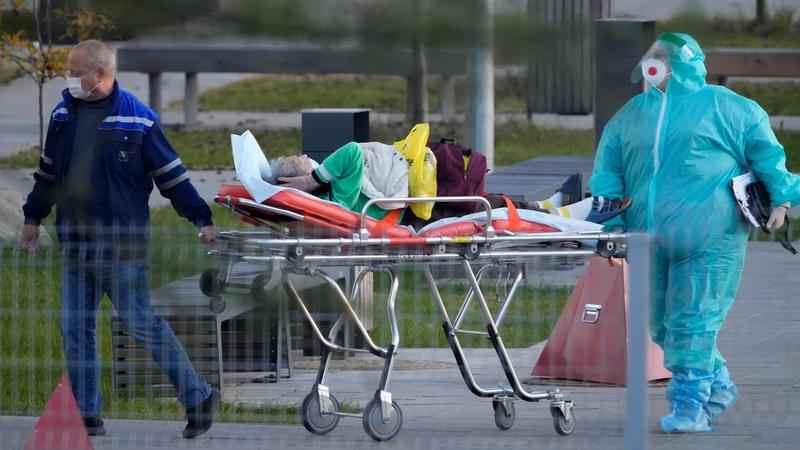Russia’s new COVID-19 infections, deaths near all-time highs

Medical workers carry a patient suspected of having coronavirus on a stretcher at a hospital in Kommunarka, outside Moscow, Russia, Monday, Oct. 11, 2021. Russia's daily coronavirus infections and deaths are hovering near all-time highs amid a laggard vaccination rate and the Kremlin's reluctance to toughen restrictions. Russia's state coronavirus task force reported 29,409 new confirmed cases Monday. That's the highest number since the start of the year and just slightly lower than the pandemic record reached in December.[AP Photo/Alexander Zemlianichenko]
Russia’s daily coronavirus infections and deaths hovered near all-time highs Monday amid sluggish vaccination rates and the Kremlin’s reluctance to toughen restrictions.
Russia’s state coronavirus task force reported 29,409 new confirmed cases — the highest number this year and just slightly lower than the pandemic record reached in December.
After registering the highest daily death toll since the start of the pandemic at 968 over the weekend, Russia reported 957 new deaths on Monday.
Russia already has Europe’s highest death toll in the pandemic — more than 217,000, according to a government task force. The state statistics agency, which uses a different way of counting including when the virus wasn’t considered the main cause of death, has reported about 418,000 deaths of people with COVID-19.
A sharp rise in infections and deaths began last month with the government attributing it to a slow vaccination rate. Deputy Prime Minister Tatyana Golikova said Friday that 47.8 million Russians, or almost 33% of its nearly 146 million people, had received at least one shot of a coronavirus vaccine, and 42.4 million, or about 29%, were fully vaccinated.
Kremlin spokesman Dmitry Peskov voiced concerns about the surge in infections and deaths and noted that hospitals in some regions are close to capacity.
"The vaccination level we have is too low, impermissibly low," Peskov said in a conference call with reporters. "That is why we have mortality numbers that are so high. We are using every opportunity to make a simple call on all citizens — go ahead and get the shot."
While deploring Russia’s lagging pace of vaccinations, Peskov rejected the idea of imposing fines on those who fail to get the vaccine and emphasized that it’s up to regional authorities to decide whether to tighten local coronavirus restrictions.
Russian President Vladimir Putin says he has been vaccinated with domestically-designed Sputnik V vaccine and he spent two weeks in self-isolation last month after some of his close aides tested positive for COVID-19.
Putin later hailed the efficiency of Sputnik V, saying that he didn’t contract the virus even though he worked closely for an entire day with an aide who got infected.
Speaking Monday during a call with top officials, Putin had an occasional cough. When an obsequious speaker of the upper house of parliament enquired about his condition during a later video call, the 69-year-old Russian leader said he was feeling fine.
"Don’t worry, everything is fine," Putin said. "I undergo tests practically on daily basis and not just for COVID-19 but other infections as well. It was simply cold outside and I moved a bit more energetically, there is nothing horrible."
Some Russian regions have limited attendance at large public events and restricted access to theaters, restaurants and other places to people who have been vaccinated, recently recovered from COVID-19 or tested negative in the previous 72 hours.
However, life remains largely normal in Moscow, St. Petersburg and many other Russian cities, with businesses operating as usual and mask mandates loosely enforced. On Monday, authorities in Moscow announced the expansion of free coronavirus tests in shopping malls, saying it should help stem contagion.
Overall, Russia’s coronavirus task force has registered over 7.8 million confirmed cases and 217,372 deaths. However, reports by Russia’s state statistical service Rosstat that tally coronavirus-linked deaths retroactively reveal significantly higher mortality numbers.
Rosstat on Friday said coronavirus mortality data showed more than 254,000 deaths of people with COVID-19 in the first eight months of this year compared to over 163,000 deaths of virus patients for all of 2020.
Unlike the coronavirus task force, which that only counts deaths where COVID-19 was the main cause, Rosstat also tallies those who had COVID-19 but died of other causes, and those for whom the virus was suspected but not confirmed.